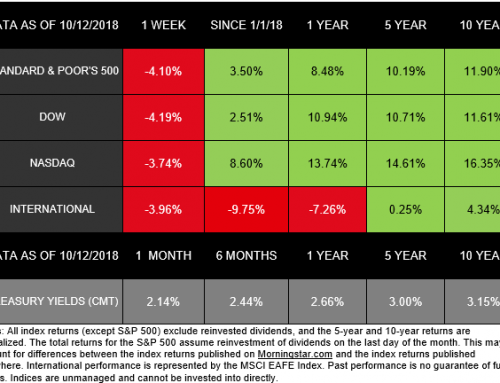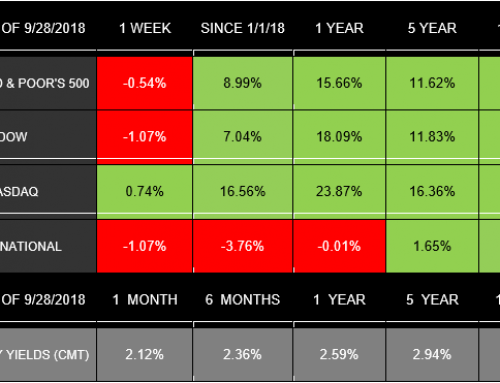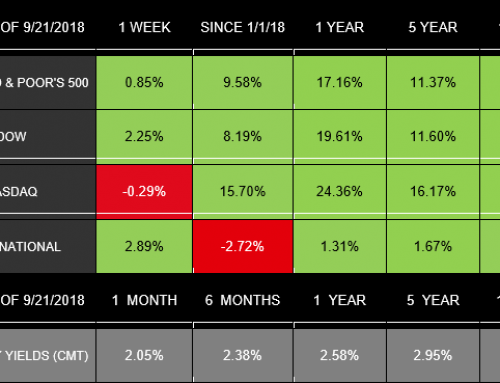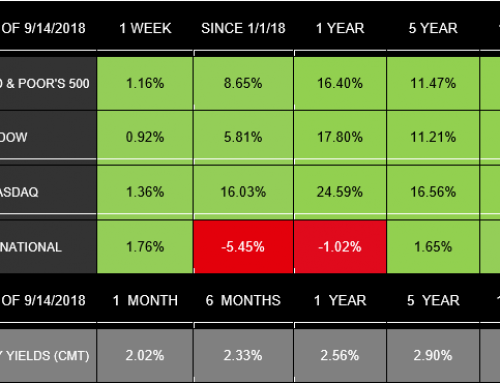The Week on Wall Street
Last week, the Federal Reserve cut interest rates for the first time in more than a decade, in line with Wall Street’s expectations. Ironically, stocks had their worst week of 2019.
The S&P 500 finished the week 3.10% lower. The Dow Jones Industrial Average and the Nasdaq Composite also posted weekly losses; the blue chips fell 2.60%, while the premier tech benchmark slumped 3.92%. International stocks tracked by MSCI’s EAFE index dipped 1.06%.[1],[2],[3]
Fed Cuts Benchmark Interest Rate
On Wednesday, the central bank reduced the federal funds rate by 0.25%. The latest Fed policy statement noted that “global developments” and “muted inflation” influenced the decision.
Addressing the media, Fed Chairman Jerome Powell described the cut as a “mid-cycle adjustment.” After that comment, Wednesday’s trading session turned volatile on the interpretation that the cut was a “one and done” move, instead of what might be the first in a series.[iv]
More Tariffs Planned
Shares also fell Thursday, after a White House tweet indicated that the U.S. would put a 10% tariff on another $300 billion of goods coming from China, effective September 1.
Practically speaking, this would mean a tariff on nearly all Chinese products arriving in America. So far, the announcement has not affected plans for trade delegates from both nations to continue negotiations in September.[v]
The Latest Hiring Data
Payrolls expanded with 164,000 net new jobs in July, according to the Department of Labor. The headline jobless rate stayed at 3.7%; it has now been under 4% for 17 months. The U-6 jobless rate, which counts both underemployed and unemployed Americans, dipped to 7.0%, a level unseen since December 2000.
Monthly job growth has averaged 140,000 over the past three months, compared to 187,000 in 2018.[vi]
THE WEEK AHEAD: KEY ECONOMIC DATA
Monday: The Institute for Supply Management releases its latest Non-Manufacturing Purchasing Managers Index, its monthly gauge of business activity in America’s service sector.
Source: Econoday / MarketWatch Calendar, August 2, 2019
The Econoday and MarketWatch economic calendars list upcoming U.S. economic data releases (including key economic indicators), Federal Reserve policy meetings, and speaking engagements of Federal Reserve officials. The content is developed from sources believed to be providing accurate information. The forecasts or forward-looking statements are based on assumptions and may not materialize. The forecasts also are subject to revision.
THE WEEK AHEAD: COMPANIES REPORTING EARNINGS
Monday: Marriott International (MAR), Tyson Foods (TSN)
Tuesday: Walt Disney Co. (DIS)
Wednesday: American International Group (AIG), CVS Health (CVS)
Thursday: Booking Holdings (BKNG), Uber (UBER)
Source: Zacks, August 2, 2019
Companies mentioned are for informational purposes only. It should not be considered a solicitation for the purchase or sale of the securities. Any investment should be consistent with your objectives, time frame and risk tolerance. The return and principal value of investments will fluctuate as market conditions change. When sold, investments may be worth more or less than their original cost. Companies may reschedule when they report earnings without notice.
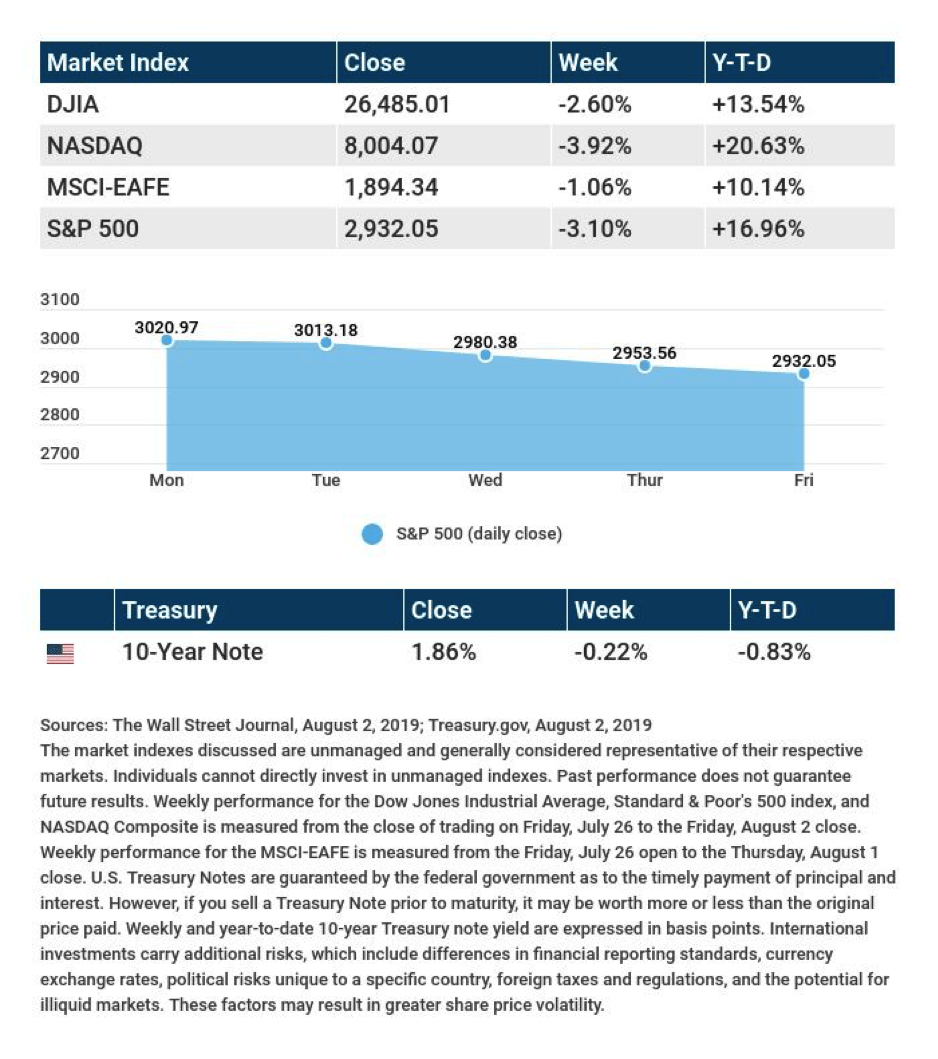
Investing involves risk including the potential loss of principal. No investment strategy can guarantee a profit or protect against loss in periods of declining values.Diversification does not guarantee profit nor is it guaranteed to protect assets.International investing involves special risks such as currency fluctuation and political instability and may not be suitable for all investors.
The Standard & Poor’s 500 (S&P 500) is an unmanaged group of securities considered to be representative of the stock market in general.
The Dow Jones Industrial Average is a price-weighted average of 30 significant stocks traded on the New York Stock Exchange and the NASDAQ. The DJIA was invented by Charles Dow back in 1896.
The Nasdaq Composite is an index of the common stocks and similar securities listed on the NASDAQ stock market and is considered a broad indicator of the performance of stocks of technology companies and growth companies.
The MSCI EAFE Index was created by Morgan Stanley Capital International (MSCI) that serves as a benchmark of the performance in major international equity markets as represented by 21 major MSCI indices from Europe, Australia, and Southeast Asia.
The 10-year Treasury Note represents debt owed by the United States Treasury to the public. Since the U.S. Government is seen as a risk-COMPLIMENTARY borrower, investors use the 10-year Treasury Note as a benchmark for the long-term bond market.
Opinions expressed are subject to change without notice and are not intended as investment advice or to predict future performance.
Past performance does not guarantee future results.
You cannot invest directly in an index.
Consult your financial professional before making any investment decision.
Fixed income investments are subject to various risks including changes in interest rates, credit quality, inflation risk, market valuations, prepayments, corporate events, tax ramifications and other factors.
These are the views of Platinum Advisor Strategies, LLC, and not necessarily those of the named representative, Broker dealer or Investment Advisor, and should not be construed as investment advice. Neither the named representative nor the named Broker dealer or Investment Advisor gives tax or legal advice. All information is believed to be from reliable sources; however, we make no representation as to its completeness or accuracy. Please consult your financial advisor for further information.
By clicking on these links, you will leave our server, as the links are located on another server. We have not independently verified the information available through this link. The link is provided to you as a matter of interest. Please click on the links below to leave and proceed to the selected site.
[1] https://www.apnews.com/e15c18b9dbc44efab400d2214e2cb6f9
[2] https://www.wsj.com/market-data
[3] https://quotes.wsj.com/index/XX/990300/historical-prices
[v] https://www.cnn.com/2019/08/01/investing/asian-market-latest-trade-war/index.html
[vi] https://www.cnn.com/2019/08/02/economy/july-jobs-report/index.html

